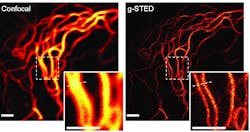Leica Microsystems signs license agreement for super-res STED technique
Leica Microsystems (Wetzlar, Germany) has signed an agreement with the Max Planck Society (Munich, Germany) and the German Cancer Research Center (DKFZ; Heidelberg, Germany) to develop a super-resolution stimulated emission depletion (STED) microscopy technique. The agreement gives Leica the license to develop the new technology, dubbed gated STED (g-STED), into a commercial product and put it on the market.
g-STED boosts the resolution and contrast previously attained with continuous-wave stimulated emission depletion (CW-STED) microscopy while reducing laser intensity. Doing so enhances photostability as well as live cell capability, bringing about more applications. g-STED also increases the number of questions that can be addressed with STED fluorescence correlation spectroscopy (STED-FCS), and will especially target the observation of molecule movements in the membrane of living cells.
Leica will commercialize g-STED for launch in the first half of 2012. Additionally, the company's existing TCS SP5 and TCS STED CW confocal systems can be upgraded with g-STED.
